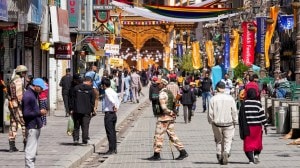End of story
Francis Fukuyama was supposed to have at least set the Yamuna on fire during his reincarnated sessions in the capital these past few days. I...

Francis Fukuyama was supposed to have at least set the Yamuna on fire during his reincarnated sessions in the capital these past few days. Instead, the author of the End of History was as cold as a deflated souffle, pedantically explaining notions of trust to a third world audience permanently used to living without the cushion of dollar IOUs.
Interestingly, the Hindustan Times conference over the weekend was really electrified by the passionate speeches of the south Asiawallahs, such as Asfandyar Wali Khan, grandson of Khan Abdul Ghaffar Khan, the inimitable Benazir Bhutto and homegrown industrialists such as Anil Ambani. All three Americans — Fukuyama, Richard Haas, chief of the prestigious thinktank Council on Foreign Relations, even former secretary of state Madeleine Albright — pretty much fell through the cracks. But that would be side-stepping the story.
Turns out Fukuyama actually had a bit of a past before he stopped the world short with End… In the early 1980s the American thinker was employed with Rand Corporation, yet another powerful US thinktank that often doubles as fodder for Washington administrations. That’s when he travelled to Pakistan (having deposed and ordered the hanging of Bhutto, Zia-ul-Haq was pretty much the ruler of all he surveyed in Pakistan) and wrote a Trip Report.
Fukuyama lavished attention on all he saw, praising Zia to the gills. It helped that the Soviets had by then invaded Afghanistan and the CIA was already running the jehad along with the ISI. That visit clearly helped Fukuyama sort out his thoughts.
The silent Pathan
The tall and strapping Asfandyar Wali Khan, meanwhile, chain-smoked on the margins of the same conference, but refused to say a single word in criticism of India — which, many would say, has since 1947 refused to support the Pathans against the machinations of Pakistan. Did he agree with the title of the book written by Gandhiji’s secretary, Pyare Lal, on the same subject and called Thrown to the Wolves?
Wali Khan smiled enigmatically in reply. ‘‘Hamen bilkul gilaah nahin hai (We have no complaint),’’ he said repeatedly. What about the (ironic) fact that it was G.D. Birla who is said to have persuaded Gandhi that it would be too expensive to keep the Frontier with India? The smile appeared again. Khan would not even comment on his 1965 public rally, when he was arrested for criticising Pakistan for going to war with India.
Meanwhile, he said he had invited Prime Minister Atal Behari Vajpayee to Peshawar on January 20, on the death anniversary of Badhshah Khan, to mark which he was organising a peace conference. Asfandyar Khan said he knew the prime minister was already going to the SAARC summit in Islamabad in early January, but he keenly hoped India would be represented by External Affairs Minister Yashwant Sinha.
Back on the diplomatic train
In a farewell letter to colleagues in missions abroad in late November, previous Foreign Secretary Kanwal Sibal paid tribute to the metaphor of a train on its present continuous journey, starting and stopping for diplomats whose time had come to get off.
At a farewell speech in the MEA he startled many by the frankness of his comments, about how it always came as a bit of a shock when it was your own time to retire. It now seems that Sibal could still get back on that train in a few months time, by becoming India’s next deputy to National Security Advisor Brajesh Mishra.
Sibal is being tipped to succeed Satish Chandra, a former high commissioner to Pakistan, who is in turn being tipped to take over the directorship of the government-funded Institute for Defence Studies and Analyses. The rumour mills are agog.
Dining Miss Bhutto
Laloo Prasad Yadav, the hero of the recent parliamentarian delegation to Pakistan, flew in especially from Patna to attend the Hindustan Times dinner — on the condition that he be seated at the same table as Benazir Bhutto. (He also got Madeleine Albright, who thoroughly quizzed her fellow diners about Laloo’s charm, buffoonery as well as political acumen, presumably leaving India a much more enlightened human being.) At first, Bhutto seemed to be turning up her very aquiline nose at this rustic from the Indian backwaters, until she was told that he was the one and only Laloo Yadav. She whipped around and you could see her switching on her charm button.
By the time she called him the ‘‘ruler of Bihar’’, Laloo had decidedly wilted under the onslaught. Undeterred by the rules of English grammar, he was in deep and animated conversation with Benazir right through dinner. By the time the dessert arrived, the more formal ‘Miss Bhutto’ had been replaced by the familiar ‘‘Madam’’.



- 01
- 02
- 03
- 04
- 05



























